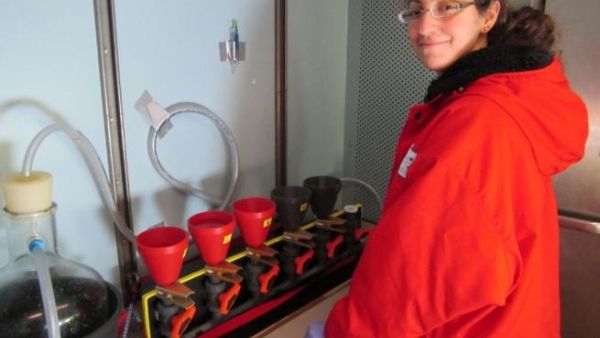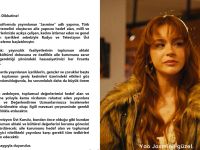AUC student works to combat global warming

As part of her master’s research in the biotechnology program at The American University in Cairo (AUC), Mariam Rizkallah, has returned from a one-month expedition in the Arctic Circle where she was part of an international research team composed of renowned scientists and researchers, as well as undergraduate and graduate students. The team embarked on the journey to the Arctic in the hopes of collecting samples of microorganisms that play a key role in global biogeochemical cycles and could unlock keys to global warming. “Over the past century, the sea level has risen about 20 centimeters, and with the continuous and rapid melting and shrinking of the Arctic glaciers, it is estimated that the sea level will rise to about 150 centimeters by the end of this century,” said Ahmed Moustafa, assistant professor of genomics and bioinformatics and Rizkallah’s thesis co-adviser with Klaus Valentin of the Alfred Wegener Institute in Germany. “This would put Alexandria and other Mediterranean cities under the sea, which would cause a terrible humanitarian and economic disaster in Egypt.”
The project, titled Sea of Change: Eukaryotic Phytoplankton Communities in the Arctic Ocean, examines the effects of global warming on eukaryotic phytoplankton, photosynthetic marine organisms, which are the basis of the entire Arctic food web and are responsible for 50 percent of oxygen production on Earth. “These organisms are envisioned to play a key role in controlling the accumulation of greenhouse gases, especially carbon dioxide, in the atmosphere,” said Moustafa.
These species, added Moustafa, also offer a potential solution for another major societal concern—energy. “Like plants, phytoplankton organisms can be used as a source of biofuel, a promising alternative for clean energy,” he said. “However, the phytoplankton solution is much more favorable than the plant –based one because it does not compete with human food and does not require massive areas of land to grow the biofuel crops.”
Funded by the United States Department of Energy of the Joint Genome Institute, the project brought the team together on the research vessel Polarstern (Polar Star), which traveled from Germany to Norway to Greenland. The team collected 350 water samples and microalgae growing underneath sea ice. “There is a huge world out there,” said Rizkallah. “There are beautiful organisms that we share the planet with.” The samples were then sent to the Alfred Wegener Institute for DNA and RNA extraction, cultivation and live community examination, as well as chemical and nutrient analyses.
For Rizkallah, who plans to pursue her PhD with a focus on genomics and bioinformatics, the experience enhanced her knowledge as a young scientist, learning about diverse topics from phyto optics, physical oceanography, climate simulation models, annual ice-mass loss and plate tectonics assessments. “The amount of information I gained firsthand was incredible,” said the 24-year-old Rizkallah. “I am very lucky and honored that I didn’t know about all that by surfing Wikipedia or even by meeting experts over tea at a conference, but by working in well-equipped labs alongside some of the best scientists in the world.”
In addition, Rizkallah enjoyed working as part of a team. “With stations around the clock, we had to forget about normal sleeping patterns,” she said. “We would organize ourselves in shifts to monitor the water profiles. When we began to run out of membrane filters, with which we catch the organisms, we all worked together to plan our station wisely. When mammalian life watchers saw a polar bear or a whale, they immediately shared the joy with us to come and watch. We were all in it together.”
A pharmacy graduate from Cairo University, Rizkallah has been working as a teaching and research assistant at AUC for the past year while pursuing her master’s in biotechnology. She was nominated for the expedition because of her unique qualities. “Mariam is a well-skilled molecular biologist and bioinformatician, a highly demanded and appreciated unique combination for biomedical scientists in both academia and industry,” said Moustafa. “She is a curious young scientist with excellent analytical skills, a creative mind and remarkable problem-solving ability. She has what it takes to participate in such a large-scale, international project, and she has done an amazing job during the Arctic expedition as an ambassador for all young Egyptian scientists, particularly AUCians.”
Background Information
American University of Cairo
Founded in 1919, AUC is a leading English-language, American-accredited institution of higher education and center of intellectual, social and cultural life of the Arab world. Its community of students, parents, faculty and staff, trustees, alumni and other generous sponsors represent more than 60 countries. The University stands as a crossroads for the world’s cultures and a vibrant forum for reasoned argument, spirited debate and understanding across the diversity of languages, facilities and human experiences.






